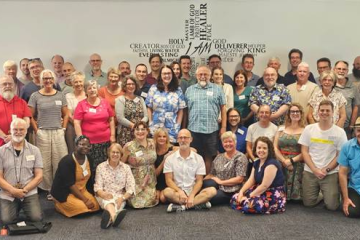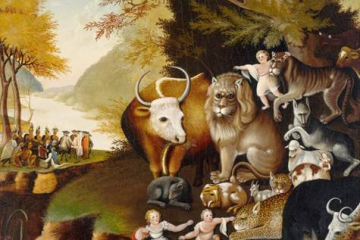Over the last four weeks we’ve explored the Baptist Mission Australia theme of ‘Mending’. We heard Beth Jackson speak about that beautiful Christmas tree ornament and God’s ‘renewing’. On Mother’s Day I spoke about ‘relating’; how God’s love is a love that urges us to live bigger, shine brighter and love harder. Last Sunday Mike Bartlett spoke about God’s desire to see our world ‘restored’ and this morning we look at ‘responding’ to God’s call.
When I think about responding to God’s call I am taken back to standing in front of a church book stall (I think it was at Castle Hill Baptist and my father must have been preaching there) looking at a copy of The Small Woman: The story of Gladys Aylward, and my uncle, coming past and seeing my interest and buying the book for me.
Some of you will know the story of Gladys Aylward – how she responded to God’s call.
She was born in 1902 to a working-class family in North London, and from her early teens became a housemaid. Then, at a revival meeting she dedicated her life to serving God and became convinced she was called to preach the gospel in China. I don’t think the China Inland Mission took a young housemaid’s application very seriously. She was initially accepted into a 3 month course but failed the Chinese language exams. Then she heard than an older missionary in China, Jeannie Lawson, was looking for someone to continue her work, so she wrote directly to Lawson who accepted her if she could get herself to China. She could not afford the ship fare, but her family scraped together all their funds to send her by the Trans-Siberian Railway, despite the fact this was 1930 and China and the Soviet Union were engaged in an undeclared war. It was an incredibly dangerous journey, but eventually she reached Yangcheng County and worked with Lawson. Later she worked for the Chinese government to enforce a law against foot binding of young Chinese girls. In 1936 she became a Chinese citizen and was a revered figure, caring for orphans, advocating for prison reform, and risking her life many times, particularly during the Japanese invasion, to help those in need.
I loved the story of Gladys Aylward as an eight or nine-year-old, but it also terrified me. I read it as telling me I would have to do what Gladys had done – go to China (which I did not want to do!) and face all that she faced (which I really did not want to do!!) if I wanted to respond to God’s call (which I wanted to do with my whole eight or nine-year-old heart).
Our reading for today, John 1:35-42, is a corrective to the understanding I had, as a young girl, of what it means to respond to God’s call; for here we have a different account of the calling of the first disciples – not Jesus fronting up to fishermen and telling them, “Follow me,” – but John saying to his disciples, “This is the one. This is the one sent by God. The one who will save us. The one who will be our salvation,” and the disciples, of their own volition, running after Jesus.
So, rather than telling people to follow him, Jesus, in John’s gospel, turns around and discovers people already are! Jesus, in John’s gospel, doesn’t command, but instead asks the question, “What are you looking for?”
“What are you looking for?” It’s a good question, isn’t it? What is it that you desire? What is that you really want – and want to be part of? “What are you looking for?” It reminds me of the Frederick Buechner (BEEK-ner) quote, “The place God calls you to is the place where your deep gladness and the world’s deep hunger meet.”
God invites us to seek the activities that will bring us deep gladness. To discover these, Buechner suggests, we need to listen to our lives; in the moments of excitement, in the difficult times and in the very ordinary, mundane moments… What it is that makes us truly glad? It is these moments that whisper to us something of the work God has given us to do.
I wish someone had sat me down, age eight or nine, and said, “OK, Going to China brought Gladys deep gladness, but what would bring you deep gladness? What are you looking for?” And yet, as I have gone through my life, I have found it. I found it in being part of and nurturing Christian community at university. I found it in unexpectedly being asked to care for a congregation in Japan (the irony of being in Japan – so close to China – was not lost on me) and I found it in being asked to come and serve this community in Canberra.
Buechner also suggests that the way to discover your deepest gladness, to listen to your life, is to follow your feet. “When you wake up in the morning, called by God to be a self again, if you want to know who you are, watch your feet. Because where your feet take you, that is who you are.” (Buechner, The Alphabet of Grace.)
These two disciples in John follow their feet, responding to Jesus’ question, “What are you looking for?” with, “Teacher, where are you staying?”
Another moment that comes to mind when I think about responding to God’s call is a conversation I had with my dad, when I was fifteen or sixteen, about obeying God’s will. “What will I do,” I asked, “if I fall in love with someone who God doesn’t want me to marry?” “How will you be sure of that? That you shouldn’t marry them” asked my father? “Wouldn’t falling in love with them be a good sign that you were meant to marry them?”
Now, it might not be a failproof method. Nothing is human failure proof! But it opened my eyes to the possibility that God might work with and in my own desires – not against them. That in loving God I might also love what God loves.
“Let us stay with you,” the disciples are saying. Let us stay with you all afternoon, until it’s so late you invite us to dinner and then to stay the night and then always. Let us stay with you and learn to love what you love.
The Greek verb here for ‘stay’ is ‘meno’ – abide, remain, endure, continue. It has a sense of permanence or stability. It is the verb John the Baptist uses, a few verses before, to describe the Spirit of God remaining on Jesus. It is the verb Jesus uses to promise, in John 15, that he will abide in those who abide in him.
Abiding with Jesus, abiding in Jesus, takes us, Frederick Buechner says, into the places of “the world’s deep hunger”. This is where Jesus is found. We both look inward to find our deep gladness and outward at the world – “at the nightly news with the sound turned off, at the world in all its pain and anguish and deep hunger and ask, ‘How can my deep gladness touch this?’” (Ryan Pemberton, blog, www.calledthejourney.com)
This is why Gladys Aylward went to China. Why these two disciples followed Jesus. Because they wanted to use their gifts and energies as part of Jesus mission. Because they wanted to join with God in mending a beautiful, broken world. Most of all because they wanted to be where Jesus was – to remain with him.
For Jesus’ response to these disciples is, “Come and see.”
A final moment I associate with responding to God’s call was a casual remark a boyfriend’s flatmate made to me in my 20’s. He was explaining why he had become a lawyer; that his dad had been a lawyer and he’d seen what the job involved and realised he’d be good at it and enjoy it. “It’s the same reason,” he said to me, “that you, Belinda, are going to become a minister.” It was before the Baptist churches were accrediting women and I don’t think I’d ever mentioned ministry to him, but that remark, his observations, and his encouragement, was an invitation to me to, “Come and see.”
“Come and see.” There is an openness in that invitation. It says that finding the place where your deep gladness and the world’s deep hunger meet is not an exact science. There is invitation to explore – to find out what following Jesus looks like, feels like, is like, for ourselves. And it is a progressive invitation – keep coming, keep exploring, keep discovering – knowing that in new ventures of faith we will always abide, remain, endure and continue in his love.
Last Sunday, during high tea and the manse, Elizabeth Paynter came to me and said, “Belinda, I’ve noticed that I am really good at looking after small children. Could I run a creche for small children?” I said I had noticed she was good at looking after small children, too, that we’d probably need some adults to help, but I would keep thinking about that. Can you all think about that with me?
Elizabeth is eight and half years old. Our invitation to find our deep gladness, to meet the world’s deep hunger, to come and see – comes at any age and comes at every age.
Is there an invitation here for you? Is there a step of faith you want to take; exploring your faith further, stepping into a new role or ministry, making a new or renewed commitment to serve God?
Is there an invitation here you can share with others? Perhaps it is noticing what God is doing in someone else’s life and encouraging them. Perhaps it is supporting one of the many wonderful things that David or Peter or Steve or Cordelia or Doug or Glenn or Meryl or Tracey or someone else might suggest for our Community Centre. Perhaps it is sharing your faith with someone – simply by sharing who you are – what makes you glad and what you love about being part of church and God’s mission, and inviting them to “Come and see” – passing on that open invitation.
During this service we have reflected on where we see God working and one thing we like about this church, about coming to church…
Can I invite you now – as we sing this next hymn – to think about that invitation God is extending to us – to discover our deep gladness, to find God with us in the deep hunger of our world and to keep following God.
What is God inviting you to come and see and do and be today?


